The Dodgers and Phillies recently split an eventful and combative four-game series in Philly which featured a fair amount of back-and-forth animosity. The two teams don’t have the same kind of arch rivalry as the Dodgers and Giants or the Yankees and Red Sox, but going back a ways, they do have some serious history: in 1950 and again in ’51 the Phillies and Dodgers played dramatic showdown games on the last day of each season with the National League pennant hanging in the balance.
The final game on October 1, 1950 is among the greatest and most famous ever played, written about and discussed many times. The Phillies, named “The Whiz Kids” because they were mostly so young, held a one-game lead over the powerhouse Dodgers, who had been breathing down their necks for weeks. It all came down to one game in Brooklyn’s Ebbets Field – if the Phillies won they took the pennant, if the Dodgers won they would force a three-game playoff against the Phils for the flag. With the Phillies’ pitching staff worn to the bone, manager Eddie Sawyer decided to start young workhorse Robin Roberts for the third time in five days – read that a few times and digest it. The Dodgers countered with sophomore ace Don Newcombe, who had pitched almost as much as Roberts down the stretch. Nobody really cared, but each pitcher was trying for his first 20-win season.

It was a pitchers’ duel all the way, and with the score tied 1-1 in the bottom of the ninth Roberts was still pitching, having surrendered just three hits. On a full count the speedy Cal Abrams worked him for a lead-off walk on a very close pitch. Pee Wee Reese followed with a rope to left field – first and second, nobody out. Sawyer had his relief ace Jim Konstanty ready, but elected to let Roberts pitch to the always dangerous Duke Snider, who ripped a sharp grounder up the middle just past second base. Abrams had to hesitate for a second to be sure the ball wouldn’t be caught by a middle infielder, and the ever-alert Richie Ashburn charged the ball in center and came up throwing, gunning down an astonished Abrams by 15 feet at home plate. The sensational play prevented the Dodgers from tying for the pennant and nobody could know it at the time, but it was the defensive equivalent of Bobby Thomson’s “Shot Heard Round the World”, which would come the next season.
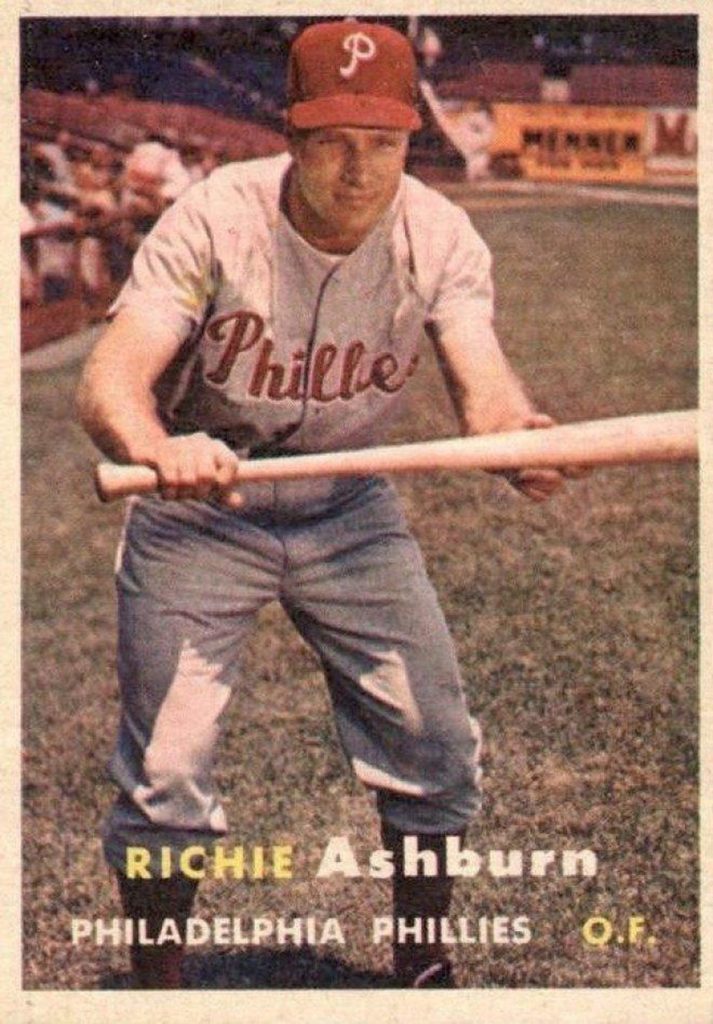
There was still plenty of trouble though, with men on second and third and one out. Roberts walked Jackie Robinson intentionally, then got Carl Furillo to foul out to Eddie Waitkus near first base. Gil Hodges came up and hit a deep fly to right field which Del Ennis, battling the sun all the way, just managed to catch against his chest. On to the 10th.
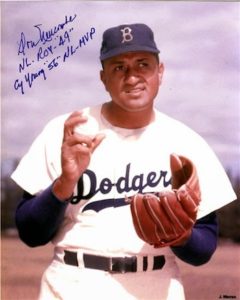
Newcombe was still pitching and, unbelievably, Sawyer elected to let Roberts bat leading off, and he singled. Waitkus hit a bloop single to put two on with nobody out. Ashburn laid down a bunt, but Newk made a great play on it to nip Roberts at third. On a 1-2 count, Newk hung a fastball to power-hitter Dick Sisler, son of the great old first baseman George Sisler, and he hit it the opposite way to left field, just deep enough to clear the fence – 4-1, Phillies. Roberts made short work of the Dodgers in the 10th and the Phillies had their first pennant since 1915. Sisler took the walk-off honours, but the real heroes were the indefatigable Roberts, and Ashburn, the greatest defensive centerfielder of all time. Some game.
***
The Phillies returned to earth in 1951 and the Dodgers reasserted themselves as the NL front-runners, at least up until the middle of August. Everyone knows what happened then. The Giants started winning and kept right on winning, while the Dodgers, with a badly worn-out pitching staff, started to fade and watched their 13 and ½ game lead dwindle away to nothing by the end of September. For years I assumed the Giants caught the Dodgers on the last day of the season, but in fact the two teams entered the final weekend tied and were still tied on the final day. The Giants had to play a makeup game against the Braves in Boston, while once again the Dodgers would close against the Phillies, this time in Philly. The 1951 game was even more hair-raising than the 1950 cliff-hanger but somehow not as celebrated, maybe because it wasn’t a case of both teams playing for the pennant but rather the Phillies trying to play spoilers. The Braves-Giants game was an unusually early noon start and the Dodgers listened to the early innings before their game, aware that it was a tight pitching duel.
By the middle innings of their game the Dodgers knew the Giants had come back against the Braves with a 3-2 win, so they had to beat the Phils to force a three-game playoff against the Giants for the pennant. It didn’t look good in the early going; the Phillies led 4-0 after the second inning and 6-2 after the fourth, with the Dodgers going through pitchers like TicTac mints.
Before going any further…….. as if there wasn’t enough riding on this game, there were unique time-pressure factors in play which only increased the suspense. Firstly, the Sunday Blue Laws had been relaxed somewhat but were still in force in Philadelphia, meaning that Sunday entertainments such as this ballgame had a strict curfew of 6:00. This didn’t seem a problem at first with a 1:00 start, but as the game went 14 innings and lasted four-and-a-half hours, they just got it in under the wire and one wonders what they would have done if the game had gone any longer. If it was called on account of the curfew, there were two serious problems: One, if the Dodgers won they were already scheduled to begin their three-game playoff against the Giants in Brooklyn the next afternoon, so there wasn’t time to finish this game the next day. And two, with thousands of Dodger supporters on hand there likely would have been a serious riot if the game was called before it was over. They had to get it in.

But there was more: September 30 of that year marked the eve of Yom Kippur, the most sacred of Jewish High Holidays. Jewish law requires that all modern conveniences and entertainments – such as taking in this ballgame – be abandoned by sundown on the eve of the holiday. So imagine the frantic anxiety of millions of Jewish Dodger fans, desperately praying that their Bums would pull this one out before they had to turn off their radios or TV sets. Talk about frayed yarmulkes; the mind boggles.
Returning to the game, it was a riotous smorgasbord, far too eventful to recount in detail. The Dodgers mounted a three-run rally in the top of the fifth off curveballer Bubba Church to make it 6-5, only to see the Phillies score two in the bottom of the inning to make it 8-5. It stayed that way until the top of the eighth, when Philly reliever Karl Drews gave up consecutive one-out singles to Gil Hodges and Billy Cox. Rube Walker pinch-hit for Carl Erskine and doubled home two runs to make it 8-7. Eddie Sawyer brought in Robin Roberts – who else? – to relieve Drews. It was a somewhat surprising move, as he’d pitched eight innings against the Dodgers the day before, but that’s Roberts for you, he was the Roy Halladay of his time. Before Roberts could settle in, Carl Furillo hit a game-tying single.
The game then froze into a scoreless stalemate for five innings as the tension mounted and twilight beckoned. Scoreless, but hardly uneventful. The Phillies mounted a serious threat in the bottom of the 12th when Roberts walked and Eddie Pellagrini bunted safely for a hit. Ashburn hit a two-hopper to Hodges, whose only play was at first, the runners advancing to second and third. The Dodgers intentionally walked Willie Jones to set up a force at any base and then Del Ennis struck out looking, which brought up Eddie Waitkus. He smashed a low, wicked liner to the right of second base and Jackie Robinson dove for the ball, reaching across his body with his glove inches off the ground. He landed hard with the ball in his glove and immediately rolled over weakly and tossed the ball toward second base as if trying for a force-out there. He then collapsed on the ground, the play having knocked the wind out of him.
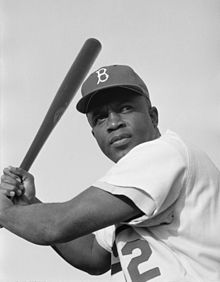
Meanwhile, Roberts, on third base, watched the ball all the way and was sure that Robinson had trapped it and dashed home with what he thought was the winning run. But umpire Lon Warneke, the old ex-Cubs’ pitcher, ruled Waitkus out to end the inning. The Phillies protested vehemently as Robinson lay on the field dazed for several minutes, but to no avail. The game continued.
Robinson remained in the game and by the 14th inning had recovered sufficiently enough to be the hero for the Dodgers, as he was so often. With Roberts now throwing his sixth-plus inning of relief, Robinson stepped up with two out and bashed a home run to left, giving Brooklyn a 9-8 lead. The bottom of the 14th was not without tension, as Ashburn got as far as second base with one out and Bud Podbeilan, well down on the Dodgers bullpen depth-chart, was pitching. But Podbeilan was up to the task, inducing a popup from Del Ennis and a meek fly from Waitkus, to end it in the nick of time. No sweat, piece of cake. After four and a half hours and 32 combined hits, the Dodgers had won their half-pennant and a date with the Giants and destiny, a.k.a. Bobby Thompson.
Under the circumstances, it was one of the wildest, most exciting and tension-packed games ever played, not to mention exhausting. This was right in the midst of The Korean War, but that conflict had nothing on these two season-ending clashes between the Dodgers and Phillies. Returning to the subject of Yom Kippur for a moment…….. the thrilling three-game playoff between the Giants and Dodgers started the next day and took place right in the middle of the holiday. The Giants had nearly as many Jewish fans as the Dodgers, so one has to surmise there was a lot of rule-bending going on in New York, some blind eyes turned in synagogues.
***
I was born in 1956 so I didn’t see either of these thrillers, but I was lucky enough to see another Dodgers-Phillies lulu on TV: Game Three of the 1977 NLCS in Veterans’ Stadium. I was just 21, in the early stages of baseball fandom and my jazz career. These Dodgers, with Dusty Baker, Rick Monday and Reggie Smith in the outfield, Steve Yeager catching and the famous infield of Steve Garvey, Davey Lopes, Ron Cey and Bill Russell, were an early favourite of mine, at least until I learned to loathe Garvey. In just his second season as manager, Tommy Lasorda guided them to the NL West crown. The Phillies’ stars were Steve Carlton, Mike Schmidt, Greg Luzinski, Larry Bowa, Bob Boone and Garry Maddux, managed by Danny Ozark, who was so wooden it always looked like he’d died an hour ago and nobody had bothered to close his eyes.
Full disclosure: The game was played on a Friday afternoon and I was scheduled to play a regular jazz session that day but begged off “sick” and played hookie to watch the game. I felt guilty and it was the first time I’d pulled a stunt like this, but not the last.
Aside from Game Six of the 1975 World Series it was the most exciting game I’d watched up to that point. I’d like to say I remember it all vividly but my memory being what it is, I had to look up the details. I do remember the Dodgers took an early 2-0 lead but surrendered it in the middle innings when Burt Hooton completely lost the strike zone and was relieved by Rick Rhoden, who didn’t fare much better. At any rate, the Phillies entered the top of the ninth with a seemingly comfortable 5-3 lead and the very capable veteran reliever Gene Garber pitching, when the following pandemonium broke loose:
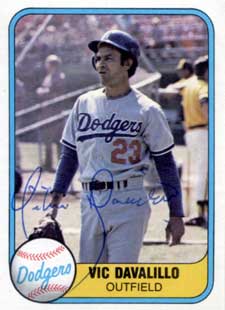
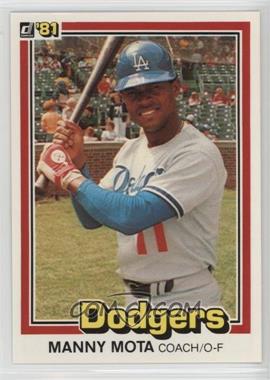
With two out the Dodgers brought in 37-year-old journeyman Vic Davalillo to pinch-hit and Garber quickly got ahead of him 0-1. But Davalillo, noticing Ted Sizemore playing unusually deep at second, shocked them with a perfect drag bunt for a single. Lasorda then sent in 39-year-old Manny Mota to pinch-hit for the pitcher. On an 0-2 pitch, Mota lashed a deep drive to left that Luzinski reached, but the ball caromed off his glove, onto the wall, and back. Luzinski fired to second to try and nail Mota, but his throw skipped wildly past Sizemore, allowing Davalillo to score and Mota to reach third.
Davey Lopes hit a blistering grounder to third that took a wicked hop and hit Schmidt on the knee. Bowa barehanded the ricocheted ball and fired to first but on a bang-bang play umpire Bruce Froeming called Lopes safe, with Mota alertly coming in from third with the tying run. There was a long and vociferous argument over Froeming’s call, but it stood.
Garber tried to pick off Lopes and threw wildly past first baseman Richie Hebner, Lopes taking second. Bill Russell then singled to center to score Lopes with the go-ahead run, before a stunned and furious crowd. Mike Garman retired the side in the ninth for the Dodgers, who had somehow snatched victory from the jaws of defeat, as the old cliche goes. It was the first time since Game Four of the 1947 World Series that the Dodgers won a postseason game when trailing in the ninth inning.
There are no words to describe the heady combination of joy and disbelief this long-shot win filled me with. It fueled my future love of the game and introduced me to at least three baseball tropes I would relive many times over in the future.
One, that maybe with a lead in the ninth inning of a must-win game, a manager should think about sending in a fielding sub for a defensive liability like Greg Luzinski. The man just murdered the ball as a hitter, but he played left field like I dance the tango.
Two, I’d never heard of either of the real heroes of this win – Davalillo, old but still fast, and the even older Mota, slow as cement but still powerful – but they were my introduction to a baseball stereotype I’ve come to adore: the veteran, wily, seldom-used Cuban pinch-hitter. Beware the baseball journeyman with lots of mileage – they come to kill you, and often succeed.
And most of all, anything can happen in a ballgame; it ain’t over till it’s over. Or until the fat lady sings, whichever comes first.
© 2019, Steve Wallace. All rights reserved.

Steve, you. Cheers, and Dave Frishberg are the best baseball jazz writers extent. If you see Georgia Ambros please say Hi. Cheers.